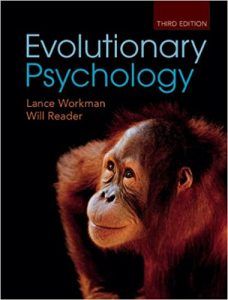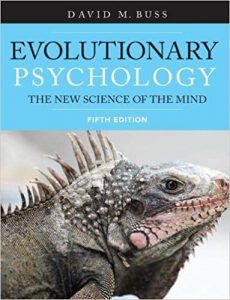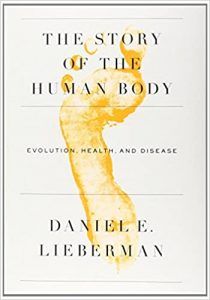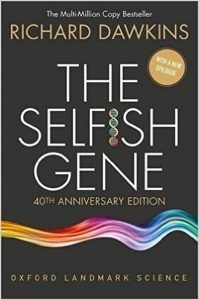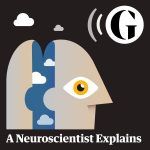What Is Evolutionary Psychology? (+ Real Life Examples)
 Like any other organ of the body, the brain is the product of many thousands of years of natural selection.
Like any other organ of the body, the brain is the product of many thousands of years of natural selection.
If this is true of the hardware, shouldn’t the same biological processes apply to the software?
Evolutionary psychologists claim that we have evolved countless mental programs, “each specialized for solving a different adaptive problem our ancestors faced” (Cosmides & Tooby, 2013).
Evolutionary psychology is more than one subject. It is a meta-theory, encompassing and building on success in cognitive science, psychology, anthropology, genetics, and evolutionary biology to understand human psychology (Balish, Eys, & Schulte-Hostedde, 2013).
This article introduces evolutionary psychology along with its claims, research findings, and surrounding controversy.
Before you continue, we thought you might like to download these three Positive Psychology Exercises for free. These science-based exercises explore fundamental aspects of positive psychology, including strengths, values, and self-compassion, and will give you the tools to enhance the wellbeing of your clients, students, or employees.
This Article Contains:
What Is Evolutionary Psychology?
Evolution is change over time. Natural selection is the engine that drives such change through the adaptation of species to their environment.
Though the idea sounds simple, it has the power to cast light on the rich diversity of life and explain how favorable traits are passed down through the generations.
Human evolution
We, as Homo sapiens, like any other species, are the sum of our genetic inheritance.
Earlier humans, poorly adapted to their environment, were less likely to survive, reproduce, and pass on their genes. Those better equipped for survival handed successful adaptations down the generations, leading to permanent transformation.
Evolutionary theory provides a new way of looking at existing ideas. Evolutionary biologist Theodosius Dobzhansky (1973) famously said:
Nothing in biology makes sense except in the light of evolution.
Could this also be true of psychology? Possibly.
Has our psychology evolved?
We tend to think of evolutionary adaptations in a physical sense. For example, our human capacity for extreme endurance is made possible by our long achilles tendons, narrow, elongated body form, and large gluteus maximus. Such specializations provide us with balance and heat dissipation while maximizing our energy return as we run (Bramble & Lieberman, 2004).
Our brain and its cognitive processes are also subject to the same evolutionary processes.
Evolutionary psychology recognizes that the process of evolution has designed both the structure and content of our physiology and psychology. Our psychological traits are necessary adaptations that have evolved to solve our ancestors’ difficulties (Balish et al., 2013).
Are we born a blank slate?
Evolutionary psychologists do not believe that we are born with an empty mind – a blank slate waiting to be written on by experience. Nor do they think of the brain as a general-purpose computer ready to be tailored to the environment into which the child arrives.
Instead, our mind is a set of highly specific, evolved adaptive programs. Mechanisms within the brain have been shaped and molded through natural and sexual selection to solve the problems found in the environment in which they evolved – known as the environment of evolutionary adaptedness (Cosmides & Tooby, 2013; Sutton, 2019).
Such environments were very different from the ones in which most of us now find ourselves.
Our long human lineage can be traced back over 6 million years to our last common ape ancestor with chimpanzees. For much of the previous 200,000 years, we lived as hunter–gatherers, only settling to a less nomadic, sedentary farming way of life within the last 10,000 years.
Therefore, our highly specific cognitive architecture solved problems that, in some cases, are quite different or even harmful to our modern way of living (Cosmides & Tooby, 2013).
For example, our universal craving for high-calorie food, stored as fat, may have ensured human survival in much earlier times but leads to obesity and related health problems in modern society. Science labels these evolved brain processes that no longer fit the modern world as psychological mismatches (Li, van Vugt, & Colarelli, 2017).
Crucially, our ancestors evolved information-processing capabilities to ensure the survival of the species, including nonverbal and verbal communication, mate selection, avoiding poisonous food and infectious disease, cooperating with kin, and dealing with enemies.
Brief History of the Field

But it was in 1859 that Charles Darwin combined multiple ideas to form the theory of natural selection and gave voice to life’s struggle for existence, each species edging forward down a path of natural selection via the mechanisms of variation, inheritance, and differential reproductive success.
While Darwin himself suggested that psychology could ultimately fall under the theory, it was only recently that we acquired the tools needed to apply it to the study of our mind (Buss, 2016).
One of the most significant early attempts to apply evolutionary theory to psychology was a branch of biology known as sociobiology. Led by E. Wilson, it was the beginning of the “systematic study of the biological basis of all social behavior” (Wilson, 1975).
The theory received considerable criticism and controversy, with claims of sexism, racism, and even unsupported suggestions that it encouraged eugenics (the improving of the population’s genetic quality).
But the term “evolutionary psychology” was born when a group of researchers including John Tooby and Leda Cosmides got together at the University of California and collaborated on the book The Adapted Mind (Barkow, Cosmides, & Tooby, 1992).
They believed that it was possible to explain human behavior based on a set of complex computations in the mind that are subject to evolution (Workman & Reader, 2015).
Scientifically Validated Theories: 4 Examples
Leda Cosmides and John Tooby (2013) describe evolutionary psychology as an “organizing framework that can be applied to any topic in the psychological sciences.” As such, it predicts behavior that can subsequently be validated through observation (Cosmides & Tooby, 2013; Buss, 2016):
Visual attention
It would not be possible to analyze and interpret everything in our field of vision; the processing required would be prohibitive. Instead, in line with evolutionary theory, our brains select specific parts of the scene for further processing.
For example, from birth onward, we pay extra attention to faces. And it makes evolutionary sense. As hunter–gatherers, we lived in small groups of between 25 and 200 people. We needed to be able to recognize those from within the group versus those from outside.
Research by cognitive scientists confirms that we more quickly identify people from our group than strangers, unless they pose a threat.
Spatial awareness
Evolutionary psychology provides a framework for predicting behavior and even differences between the sexes.
Men often outperform women in standard spatial cognition lab tests. However, based on evolutionary psychology, it was predicted and confirmed that in certain conditions women perform better than men.
Based on our long-term history as hunter–gatherers, while men typically hunted and tracked game, women foraged for plants and needed to remember locations to revisit later. When tests consider the need for specific spatial awareness skills, men and women are equally adept at knowing where they are and getting to where they need to be.
Social behavior
Game theory – a mathematical model widely used in economics for studying human interaction and reward – has been adopted by evolutionary biologists to research cooperation between organisms.
Evolutionary psychology has successfully borrowed such models to validate theories on how parties cooperate, work toward a common goal, and handle free-riders (those who want the benefit of group work without the effort).
Kin detection
Kin detection is crucial for avoiding inbreeding and ensuring kin-directed altruism. Evolutionary psychology suggests that we have “ancestrally reliable cues” to identify closeness in terms of family relations.
Research using computer modeling has proven evolutionary-based hypotheses and that such bias is often independent of our conscious beliefs (Cosmides & Tooby, 2013; Lieberman Tooby, & Cosmides, 2007).
5 Fascinating Experiments and Research Findings

Such knowledge is crucial to our understanding of who we are and opens a window into our evolutionary past.
Mental toughness
Like other personality traits, mental toughness is approximately 50% inherited (Horsburgh, Schermer, Veselka, & Vernon, 2009). Therefore, while the environment we find ourselves in matters greatly – including upbringing, experiences, and skills we develop – so do our parents, their parents, and so on.
After all, it is not difficult to imagine that mental toughness must have provided a survival advantage, helping earlier humans cope with harsh conditions including conflict, drought, and climatic change.
Religion
It is fascinating to note that religion is found in all cultures (described as a cultural universal) and often leads to behavior that appears non-Darwinian (Workman & Reader, 2015).
For example, arranged marriages and vows of celibacy appear at odds with mates chosen based on apparent physical signs of fertility or the need to disperse our genetic material widely.
It has been suggested that religion is a psychological mechanism that can help ensure the group’s survival, ultimately favoring the individual (Wilson, 2002).
In The God Delusion, Richard Dawkins (2006) argues that children’s blind acceptance of religious beliefs forms part of an adaptive “cultural acquisition device.” As such, religion is a highly successfully propagated meme – though not factual.
Attraction and mating
Evolutionary psychology theory predicts that our ancestors’ mate selection strongly influences our modern-day choice of partner.
Natural and “sexual selection should, therefore, promote ‘good’ mating strategies” (Workman & Reader, 2015). According to the theory, one sex evolves to suit another’s preferences – and if maintained, it is more likely to result in a lasting pair bond (Buss, 2016).
In foraging societies, the most successful male hunters are seen as more attractive and therefore more likely to pass on their genes and form longer term relationships. The benefits of such prolonged partnerships, including provision for the offspring, etc., must be balanced (in evolutionary terms) against the potential for reproductive success with other partners (Smith, 2004).
It is not difficult to see why evolutionary psychology conclusions are often controversial and can lead to passionate refutation from many different angles.
Jealousy
Few among us have been spared the feeling of jealousy. Perhaps, a small amount may even be useful, if kept in check.
After all, once you have found your mate, it is crucial to keep them, at least from an evolutionary perspective.
Literature suggests that the risk of low mate retention comes from more than one source: rivals who attempt to lure away the mate and short- or long-term mate infidelity (Buss, 2016). Jealousy may offer several strategies that promote vigilance to reduce situations that lead a partner to be unfaithful, including fulfilling others’ needs and warding off rivals who appear to show sexual interest.
Emotions
According to research, personality and intelligence are approximately 50% inherited, just like mental toughness. However, it is less clear cut for emotions (Penke & Jokela, 2016; Horsburgh et al., 2009).
Instead, the psychological adaptations we inherit influence our sensitivity to emotional information (Todd et al., 2015). While several people may experience the same event, we differ in our response due to both inherited and learned responses.
Evolutionary psychology: an introduction – Dr. Diana Fleischman – The Weekend University
Common Criticisms of the Field
Undoubtedly, evolutionary psychology is fascinating, not least because of its willingness to combine ideas and research from multiple cutting-edge fields including cognitive science, anthropology, information theory, and genetics.
However, it has the power to upset communities and meets resistance from academics for several reasons, including (Jonason & Schmitt, 2016; Jonason, 2017):
- Conceptual concerns
Regarding the underlying theory of evolutionary psychology - Political implications
The impact that the ideas and research have from a political and a social point of view - Validity
Can we rely on the work, the results, and what they appear to tell us? - Sampling concerns
Concerns regarding the sampling and the participants used (or absent from) studies - Religious matters
The incongruity with religious teachings
While concerns arise for political, social, methodological, and epistemological reasons, there is also resistance to evolutionary psychology’s potential as an organizing paradigm for all of existing psychology (Jonason & Schmitt, 2016).
Some of the challenges, especially those from a religious perspective, arise from resistance to seeing us as indistinct from animals (Jonason, 2017).
4 Books on the Topic
Read these recommended books to learn even more about the topic:
1. Evolutionary Psychology: An Introduction – Lance Workman and Will Reader
This book is a comprehensive introduction to the beauty and complexity of evolutionary psychology for students and practitioners interested in understanding this extraordinary field.
The text is full of the latest research and critical evaluation of the central aspects of the theory.
Find the book on Amazon.
2. Evolutionary Psychology: The New Science of the Mind – David Buss
This book offers a good grounding in all aspects of evolutionary psychology by one of the experts in the field, David Buss.
The text is well laid out and very accessible. It provides a fascinating insight into the latest thinking in this new and developing field.
Find the book on Amazon.
3. The Story of the Human Body: Evolution, Health, and Disease – Daniel Lieberman
Harvard chair of evolutionary biology Daniel Lieberman takes us on an incredible journey through the evolution of our body over millions of years.
He also describes the increasing disparity between how we live today and the environment for which we have evolved.
While not directly focusing on psychology, this insight into evolutionary theory in action is inspiring and enlightening.
Find the book on Amazon.
4. The Selfish Gene: 40th Anniversary Edition – Richard Dawkins
Richard Dawkins may be known to many for his disagreements with people of faith, but he is also an accomplished professor in evolutionary biology and an author of some fascinating books on genetics.
His book The Selfish Gene is a classic in evolutionary thinking. First published in 1976 to great critical acclaim, this 40th edition brings the gene’s eye view of evolution up to date.
Find the book on Amazon.
3 Interesting Podcasts
1. Evolutionary Psychology
Melvyn Bragg takes us on a fascinating journey through Dawkins’s work and his ongoing contribution to the new discipline of evolutionary psychology.
2. A Neuroscientist Explains: the evolutionary origins of social behaviour
Robin Dunbar, University of Oxford’s professor of evolutionary psychology, describes what our evolutionary past can tell us about our behavior today.
3. The Ape that Understood the Universe
This podcast episode is an insightful interview with evolutionary psychologist and author Steve Stewart-Williams, covering topics such as altruism and group selection.
A Take-Home Message
Whether we agree with evolutionary psychology or not, as an approach, it provides a valuable lens through which we can view and challenge our current understanding of human psychology and behavior.
It also provides an insightful way to reframe and question an established field such as psychology while drawing together knowledge from the latest research in multiple, distinct areas.
Put simply, if we assume that psychological systems are ultimately biological, then the mechanism of evolution must apply (Jonason, 2017).
And yet, while fascinating, evolutionary psychology results in multiple challenges from both within the academic and the broader community. Many criticisms arise from the sensitive nature of the areas it explores – race, gender, belief systems, and mating – and a seemingly animalistic view of human behavior.
Yet, we must remember that although evolutionary psychology explains much of our thinking, it does not, in any way, condone behavior that ignores the needs or wishes of others. We have evolved a highly complex brain that not only provides automatic and instinctual reactions but also the capacity for complex reasoning and moral thinking.
Therefore, we must take care when considering the conclusions drawn from research and how they are shared.
Evolutionary theory is a rich and powerful means to explore our whole being – both psychologically and physiologically – and can guard us against the behavioral mismatches we face between the environment we evolved for and the one in which we live.
From the perspective of our own psychology and our work with clients, evolutionary psychology can benefit how we approach unwanted behavior. Viewing our minds in light of our ancient past may explain why we behave as we do and how we can change.
We hope you enjoyed reading this article. Don’t forget to download three Positive Psychology Exercises for free.
- Balish, S. M., Eys, M. A., & Schulte-Hostedde, A. I. (2013). Evolutionary sport and exercise psychology: Integrating proximate and ultimate explanations. Psychology of Sport and Exercise, 14(3), 413–422.
- Barkow, J. H., Cosmides, L., & Tooby, J. (1992). The adapted mind: Evolutionary psychology and the generation of culture. Oxford University Press.
- Bramble, D. M., & Lieberman, D. E. (2004). Endurance running and the evolution of Homo. Nature, 432(7015), 345–352.
- Buss, D. M. (2016). Evolutionary psychology: The new science of the mind. Routledge, Taylor & Francis Group.
- Cosmides, L., & Tooby, J. (2013). Evolutionary psychology: New perspectives on cognition and motivation. Annual Review of Psychology, 64(1), 201–229.
- Darwin, C. (1859). The origin of species. Oxford University Press.
- Dawkins, R. (2006). The God delusion. Bantam Press.
- Dawkins, R. (2016). The selfish gene (40th Anniversary ed.). Oxford University Press.
- Dobzhansky, T. (1973). Nothing in biology makes sense except in the light of evolution. The American Biology Teacher, 35(3), 125–129.
- Horsburgh, V. A., Schermer, J. A., Veselka, L., & Vernon, P. A. (2009). A behavioural genetic study of mental toughness and personality. Personality and Individual Differences, 46, 100–105.
- Jonason, P. K., & Schmitt, D. P. (2016). Quantifying common criticisms of evolutionary psychology. Evolutionary Psychological Science, 2(3), 177–188.
- Jonason, P. K. (2017). The grand challenges for evolutionary psychology: Survival challenges for a discipline. Frontiers in Psychology, 8.
- Lieberman, D. (2013). The story of the human body: Evolution, health, and disease. Pantheon Books.
- Lieberman, D., Tooby, J., & Cosmides, L. (2007). The architecture of human kin detection. Nature, 445, 727–731.
- Li, N. P., van Vugt, M., & Colarelli, S. M. (2017). The evolutionary mismatch hypothesis: Implications for psychological science. Current Directions in Psychological Science, 27(1), 38–44.
- Penke, L., & Jokela, M. (2016). The evolutionary genetics of personality revisited. Current Opinion in Psychology, 7, 104–109.
- Smith, E. A. (2004). Why do good hunters have higher reproductive success? Human Nature, 15(4), 343–364.
- Sutton, J. (2019). Psychological and physiological factors that affect success in ultra-marathoners (Doctoral thesis, Ulster University). Retrieved from https://pure.ulster.ac.uk/en/studentTheses/psychological-and-physiological-factors-that-affect-success-in-ul
- Todd, R. M., Ehlers, M. R., Muller, D. J., Robertson, A., Palombo, D. J., Freeman, N., … & Anderson, A. K. (2015). Neurogenetic variations in norepinephrine availability enhance perceptual vividness. Journal of Neuroscience, 35(16), 6506–6516.
- Wilson, E. O. (1975). Sociobiology: The new synthesis. Harvard University Press.
- Wilson, D. S. (2002). Darwin’s cathedral: Evolution, religion, and the nature of society. University of Chicago Press.
- Workman, L., & Reader, W. (2015). Evolutionary psychology: An introduction. Cambridge University Press.
Read other articles by their category
- Body & Brain (50)
- Coaching & Application (57)
- Compassion (26)
- Counseling (51)
- Emotional Intelligence (24)
- Gratitude (18)
- Grief & Bereavement (21)
- Happiness & SWB (40)
- Meaning & Values (26)
- Meditation (20)
- Mindfulness (45)
- Motivation & Goals (45)
- Optimism & Mindset (34)
- Positive CBT (29)
- Positive Communication (20)
- Positive Education (47)
- Positive Emotions (33)
- Positive Leadership (18)
- Positive Parenting (4)
- Positive Psychology (33)
- Positive Workplace (37)
- Productivity (17)
- Relationships (46)
- Resilience & Coping (38)
- Self Awareness (21)
- Self Esteem (38)
- Strengths & Virtues (32)
- Stress & Burnout Prevention (34)
- Theory & Books (46)
- Therapy Exercises (37)
- Types of Therapy (64)


